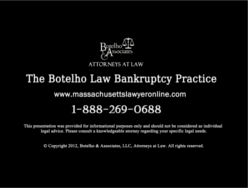Chapter 13 Bankruptcy - Part 2 | Fall River
Joseph Botelho
What is Chapter 13 Bankruptcy?
Chapter 13 bankruptcy of the U.S. bankruptcy code requires that the debtor repay some or all of the debts that they owe to creditors through a structured repayment plan. Unlike Chapter 7 bankruptcy, Chapter 13 bankruptcy does not involve the liquidation of assets or property of the individual. This generally allows the debtor to retain all their property throughout the entire bankruptcy proceedings. Chapter 13 bankruptcy is an effective debt elimination reduction tool used to reduce and consolidate an individual’s debts with even better terms and lower interest rates.
Chapter 13 Bankruptcy Requirements
Chapter 13 bankruptcy requires that the individual’s debts be partially or fully repaid. Therefore, the debtor is required to have a steady form of income in order to participate in a Chapter 13 bankruptcy proceeding. Debtors can work with their bankruptcy attorney to come up with a repayment plan that allocates a certain amount of their future income to pay off debts to their creditors. Chapter 13 bankruptcy also allows individuals the chance to catch up on their overdue payments and debts. Chapter 13 bankruptcy can be a powerful tool for the debtor to use if they wish to save their home from a foreclosure proceeding or a possible future foreclosure. Chapter 13 bankruptcy allows the debtor the opportunity to play a significant role in how their debt repayment plan will be put together and how it will proceed.
Repayment Plans
Working in conjunction with their bankruptcy attorney a debtor can formulate a plan for the repayment of some or all of the debts that best fit the situation of the debtor. The debtor’s attorney at this point drafts a concise written out plan and submits it to the bankruptcy court for their approval. The commencement of a repayment plan generally begins within (30) days after the Chapter 13 bankruptcy case is filed. And the debtor usually gets between three to five years to complete a payment plan to pay off creditors.
Creditors are required to closely follow the plan and are only allowed to collect on those debts which are included in the plan and are barred from attempting to collecting debts excluded from the repayment plan. The bankruptcy court is responsible to oversee the entire bankruptcy proceedings to ensure that the creditors and debtor follow all the terms of the repayment plan. For more information on Chapter 13 bankruptcy, Chapter 7 bankruptcy, unsecured debt settlement, or obtaining a mortgage modification please visit our website at www.massachusettslawyeronline.com. To schedule a free consultation at the Law Offices of Joseph Botelho please call us at 1-888-269-0688.
By: Joseph Botelho
What is Chapter 13 Bankruptcy?
Chapter 13 bankruptcy of the U.S. bankruptcy code requires that the debtor repay some or all of the debts that they owe to creditors through a structured repayment plan. Unlike Chapter 7 bankruptcy, Chapter 13 bankruptcy does not involve the liquidation of assets or property of the individual. This generally allows the debtor to retain all their property throughout the entire bankruptcy proceedings. Chapter 13 bankruptcy is an effective debt elimination reduction tool used to reduce and consolidate an individual’s debts with even better terms and lower interest rates.
Chapter 13 Bankruptcy Requirements
Chapter 13 bankruptcy requires that the individual’s debts be partially or fully repaid. Therefore, the debtor is required to have a steady form of income in order to participate in a Chapter 13 bankruptcy proceeding. Debtors can work with their bankruptcy attorney to come up with a repayment plan that allocates a certain amount of their future income to pay off debts to their creditors. Chapter 13 bankruptcy also allows individuals the chance to catch up on their overdue payments and debts. Chapter 13 bankruptcy can be a powerful tool for the debtor to use if they wish to save their home from a foreclosure proceeding or a possible future foreclosure. Chapter 13 bankruptcy allows the debtor the opportunity to play a significant role in how their debt repayment plan will be put together and how it will proceed.
Repayment Plans
Working in conjunction with their bankruptcy attorney a debtor can formulate a plan for the repayment of some or all of the debts that best fit the situation of the debtor. The debtor’s attorney at this point drafts a concise written out plan and submits it to the bankruptcy court for their approval. The commencement of a repayment plan generally begins within (30) days after the Chapter 13 bankruptcy case is filed. And the debtor usually gets between three to five years to complete a payment plan to pay off creditors.
Creditors are required to closely follow the plan and are only allowed to collect on those debts which are included in the plan and are barred from attempting to collecting debts excluded from the repayment plan. The bankruptcy court is responsible to oversee the entire bankruptcy proceedings to ensure that the creditors and debtor follow all the terms of the repayment plan. For more information on Chapter 13 bankruptcy, Chapter 7 bankruptcy, unsecured debt settlement, or obtaining a mortgage modification please visit our website at www.massachusettslawyeronline.com. To schedule a free consultation at the Law Offices of Joseph Botelho please call us at 1-888-269-0688.
By: Joseph Botelho



